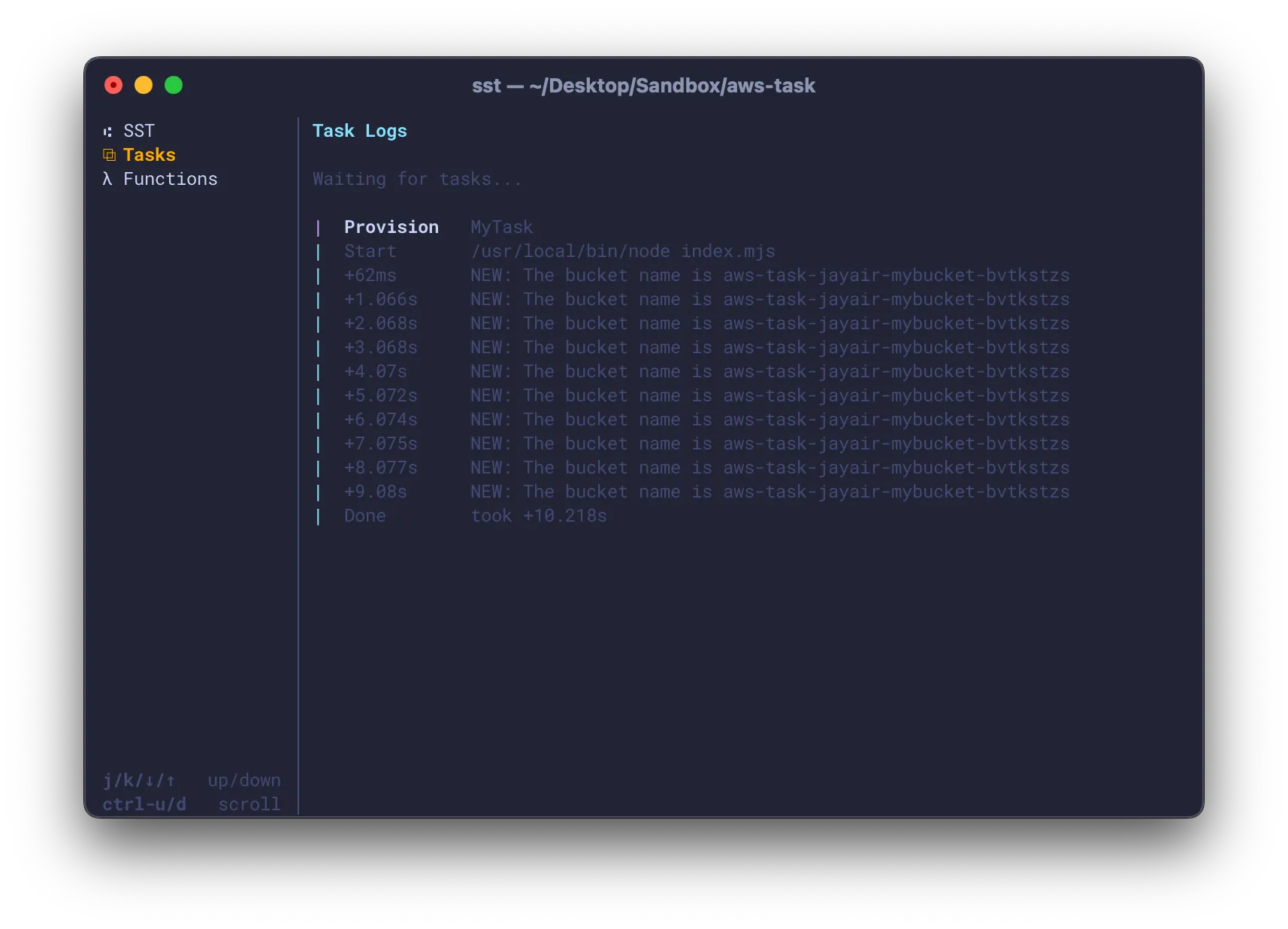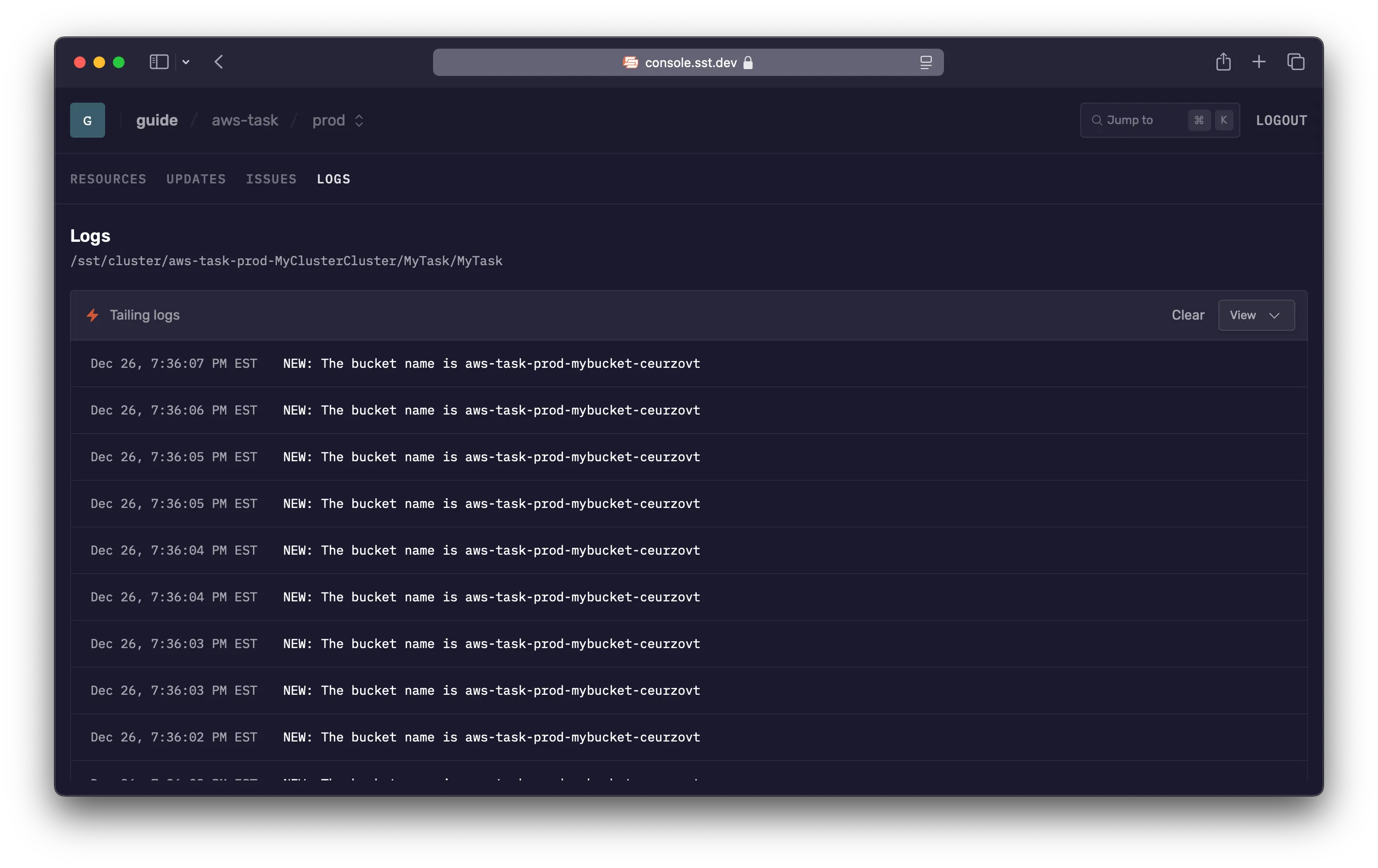Tasks in v3
We are adding Task, a new component, powered by AWS Fargate that allows you to run asynchronous tasks in your apps. Here’s a video where we talk about this and async jobs in general.
Background
Most applications have a need to run some background tasks. Typically these take a long time to run so they are triggered asynchronously. Or they are invoked through a cron job. Unfortunately you can’t run them in a Lambda function because they might take longer than 15 minutes.
And since these are triggered asynchronously, they can be harder to test locally. You can mock their invocation but it’d be much better to test them through the usual flow of your application.
To fix this, we are adding the new Task component.
Task
- It uses AWS Fargate that can run as long as you need and is cheaper than Lambda.
- Can be invoked directly from a cron job.
- Comes with a JS SDK, but can also be invoked with the AWS SDK.
- Has its own dev mode, so it can be invoked remotely but it’ll run locally.
You can check out an example if you want a quick start.
Getting started
Tasks are built on AWS Fargate and are tied to an Amazon ECS cluster. And so Task is created as a part of the Cluster component.
Create a task
const cluster = new sst.aws.Cluster("MyCluster", { vpc });const task = new sst.aws.Task("MyTask", { cluster });By default, this looks for a Dockerfile in the root directory. You can configure this.
new sst.aws.Task("MyTask", { cluster, image: { context: "./app", dockerfile: "Dockerfile", },});Run the task
Once created, you can run the task through:
-
Task SDK
With the Task JS SDK, you can run your tasks, stop your tasks, and get the status of your tasks.
You can call this from your functions, frontends, or container services. For example, you can link the task to a function.
sst.config.ts new sst.aws.Function("MyFunction", {handler: "src/lambda.handler",link: [task],});Then from your function start the task.
src/lambda.ts import { Resource } from "sst";import { task } from "sst/aws/task";const runRet = await task.run(Resource.MyTask);const taskArn = runRet.tasks[0].taskArn;Other languages
The JS SDK is calling the AWS ECS SDK behind the scenes. So if you are using a different language, you can directly call the AWS SDK. Here’s how to run a task.
-
Cron jobs
You can also connect your task to a
Cronjob.sst.config.ts new sst.aws.Cron("MyCronJob", {task,schedule: "rate(1 day)",});This works by connecting the task to the cron job through EventBridge.
Dev mode
You can test your tasks locally in sst dev in a similar way to how you test your functions Live.

Any tasks that are invoked remotely are proxied to your local machine that runs the dev.command you have. These also show up under the Tasks tab in the multiplexer sidebar.
new sst.aws.Task("MyTask", { dev: { command: "node src/tasks.js", },});If your Vpc has bastion enabled, then your tasks have access to resources in your VPC as well.
Console logs
The Console supports viewing logs for your tasks when they are in production.

Cost
You are only charged for the time it takes to run the task. With the default memory and vCPU it costs roughly $0.02 per hour.
When running in sst dev, you are charged for the time it takes to run the task locally as well.
Next steps
Learn more in our docs.
And check out these examples.
Comparison to v2
If you are coming from SST v2, there are a couple of differences between Task and Job.
Taskis based on AWS Fargate.Jobused a combination of AWS CodeBuild and Lambda.- Since
Taskis natively based on Fargate, you can use the AWS SDK to interact with it, even in runtimes the SST SDK doesn’t support. - In dev mode,
Taskuses Fargate only, whereasJobused Lambda. - While CodeBuild is billed per minute, Fargate is a lot cheaper than CodeBuild. Roughly $0.02 per hour vs $0.3 per hour on X86 machines.